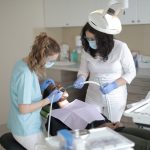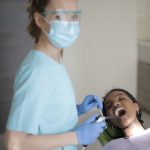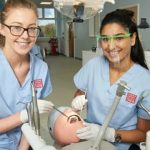Female dentists and dental care professionals (DCPs) should be well supported through the menopause and perimenopause to ensure we retain passionate and skilled clinicians in the workforce for as long as possible, according to Dental Protection.
Dental Protection said around 93% of DCPs and 52% of dentists are female, and many could at some stage be impacted by menopause symptoms such as anxiety, depression, poor concentration, brain fog, dizziness and insomnia while doing their best to care for patients in challenging environments.
It said mental wellbeing support, awareness from practice owners and managers as well as workplace adjustments may help female dental professionals continue to perform at their best, and stay in the workforce for longer.
Yvonne Shaw, Deputy Director at Dental Protection, said: “The menopause and the associated symptoms can vary widely; however, we need to ensure female colleagues aren’t suffering in silence during this phase of their lives. Brain fog, forgetfulness, poor concentration and insomnia can make any job difficult, but particularly so in a challenging environment like dentistry.
“All female dental colleagues suffering with symptoms should feel comfortable to discuss workplace adjustments and seek mental wellbeing support. Providing a working environment that is open and supportive helps to ensure those affected do not feel isolated. Having a menopause workplace policy can ensure wider understanding and provide reassurance that support will be available if needed. Managers and practice owners should consider training on the menopause and how the symptoms can impact on the wellbeing of some individuals and the wider team.
“If we do not destigmatise menopause, we may lose many skilled and highly valued dental professionals during a time when the profession can ill-afford it. A supportive culture will alleviate additional stress, enable individuals to continue to perform at their best for patients, and thrive in their careers for longer.”
Dental Protection recommendations:
- Dental practice owners should consider whether they have adequate procedures and support in place to help all staff affected by the menopause, for example by introducing a menopause policy, flexible working arrangements, and procedures which ensure those affected can seek support without fear of adverse impacts on their career or professional reputation.
- All staff, including new dentists and DCPs joining the profession, as well as those who are already practising, should be trained on the menopause.
- Dental professionals who may be struggling with menopause symptoms themselves should seek support and professional advice on options to manage symptoms and lifestyle measures. Dental Protection also has a role to play – we listen to and care for members, including offering support with their wellbeing and our 24/7 confidential counselling service is available for those struggling with the menopause.
Practice owners and managers should consider training on the menopause, including the impact the symptoms can have on working females and their teams. Anyone who is suffering with menopausal symptoms should feel supported, and able to discuss any necessary changes to working arrangements.
BADN welcomes Dental Protection statement
The British Association of Dental Nurses (BADN), the UK’s professional association for dental nurses, welcomes the statement issued by Dental Protection.
BADN has recently published its Menopause Guide and Policy for dental practices to adopt in support of menopausal employees. This BADN Policy has been endorsed by the British Association of Dental Therapists (BADT), the British Society of Dental Hygiene and Therapy (BSDHT), the British Dental Industry Association (BDIA), the College of General Dentistry (CGDent), the Dental Laboratories’ Association (DLA), the Dental Technologists’ Association (DTA), the Orthodontic National Group (ONG) and the British Veterinary Nursing Association (BVNA). The BADN Menopause Policy document is available on the BADN website.
“We are delighted that Dental Protection are supporting BADN’s move to increase awareness of menopause” said BADN President-elect Debra Worthington “to encourage discussion of the issues facing menopausal women in the workforce. We recognise that this is still a difficult subject for many people and have produced this advice sheet with lists of relevant legislation, useful articles/websites and a specimen policy to break this taboo.”
In the UK, 99% of dental nurses, 96% of orthodontic therapists, 94% of dental hygienists, 92% of dental therapists, 52% of dentists and 27% of dental technicians are female – 78% of the regulated dental profession as a whole – and the policy outlines the challenges faced by menopausal women in the workplace and suggests ways in which employers can support menopausal employees.















